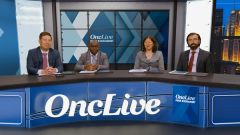
Dr. Decker on Pembrolizumab With Concurrent Chemoradiotherapy in Inoperable Locally Advanced NSCLC
Roy H. Decker, MD, PhD, discusses the use of pembrolizumab with concurrent chemoradiotherapy in patients with inoperable, locally advanced non–small cell lung cancer.
Episodes in this series

Roy H. Decker, MD, PhD, a professor of Therapeutic Radiology; vice chair for Clinical Research, Therapeutic Radiology; director of the Clinical Trials Office; and associate cancer center director, Clinical Sciences at Yale Cancer Center, discusses the use of pembrolizumab (Keytruda) with concurrent chemoradiotherapy in patients with inoperable, locally advanced non–small cell lung cancer (NSCLC).
The standard of care for patients with inoperable, locally advanced disease has been chemoradiation followed by the checkpoint inhibitor durvalumab (Imfinzi), since the phase 3 PACIFIC trial (NCT02125461), according to Decker, who is also the Disease Aligned Research Team Leader, Therapeutic Radiology, and associate director of the Residency Training Program, Therapeutic Radiology.
In a phase 1 study (NCT02621398), a checkpoint inhibitor was added incrementally earlier in the treatment course. In the final cohort, patients received weekly carboplatin and paclitaxel with concurrent radiation and started full dose pembrolizumab on the first day, which was received concurrently with chemoradiation, Decker says. Pembrolizumab was also administered in the adjuvant setting.
This was one of the first studies that demonstrated feasibility in moving the checkpoint inhibitor earlier in therapy where it could have an even greater benefit in patients with NSCLC, Decker concludes.































































